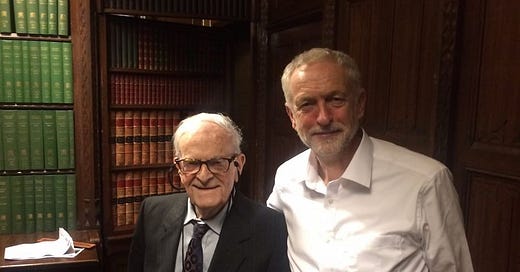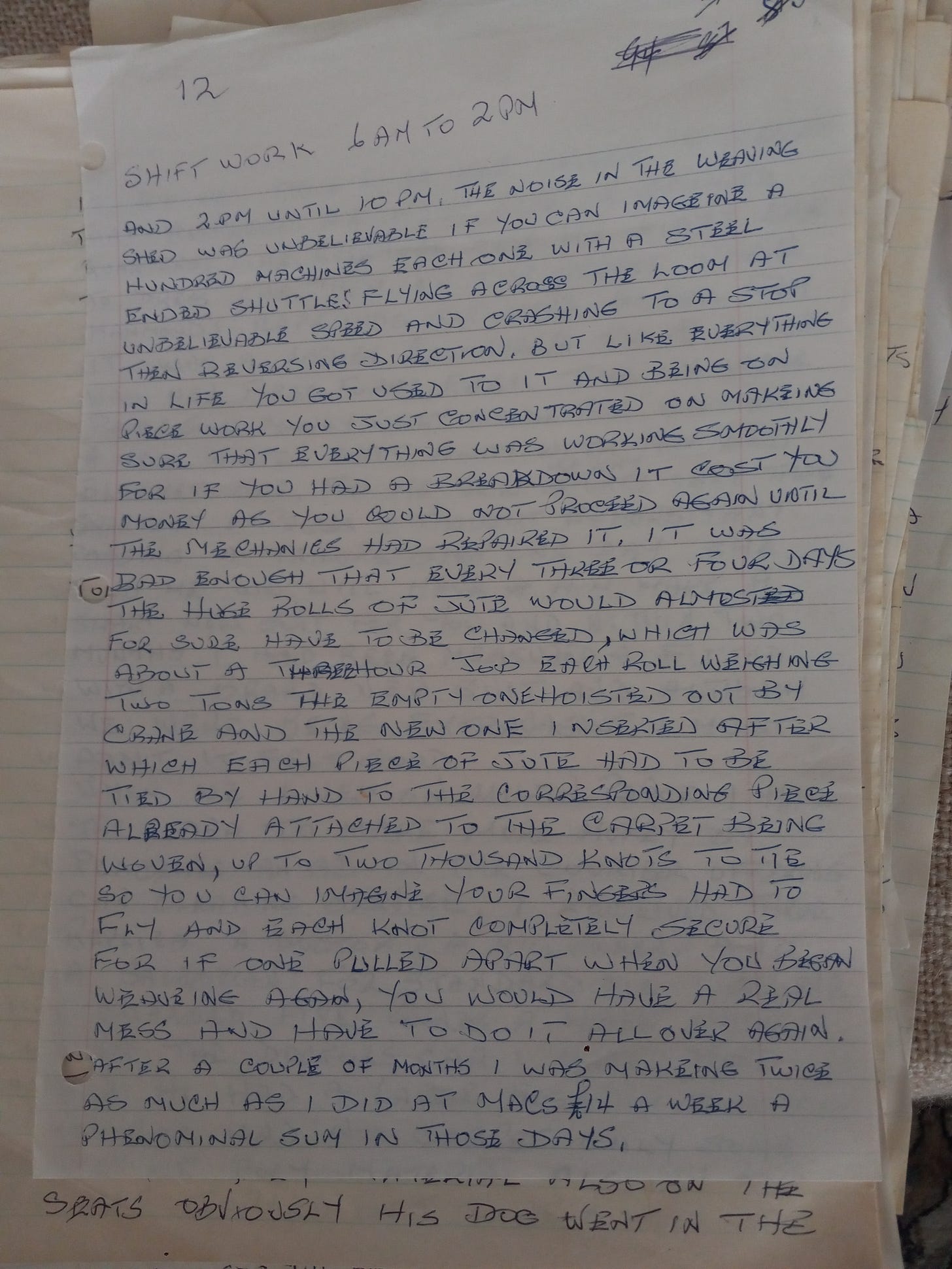It was anger, solidarity and socialism that built the Welfare State and kept the West safe from authoritarianism until neoliberalism corrupted everything.
Harry Leslie Smith
February 25, 1923-November 28, 2018
“I am going out of this World Fighting.”
From the unpublished Green & Pleasant Land-a memoir of life before the Welfare State.
Chapter Five:
Humans are hardwired to keep hope alive and believe that tomorrow can be better than today. For the poor, it seldom is because when there is no social safety net; your poverty can't be outrun. It doesn't stop people from trying. Many times, Mum attempted to slip her chains of poverty. She married my father because she wanted to believe he could provide a better life for her. Instead, their marriage put both of them on a quick road to penury. Then, in 1928, after my father lost his job in the mines because of injury; she upped sticks with him and my sister and me for Bradford. She wanted to believe new beginnings were possible for those without money or work. But it was the same old...
In Bradford, like Barnsley, no one wanted to hire my father for work because he didn't look physically up to a day's manual labour owing to his age.
During our first year in the city, we subsisted on poor relief- provided by the local council. It afforded us enough for the barest of food rations- so as not to starve but not to eat nutritiously.
Being underfed created a host of physical symptoms for me and my sister, which included leg ulcers and boils that erupted on my body. These afflictions were commonplace in our neighbourhood- along with lice, rickets and TB.
In 1929, when the world's stock market crashed, neither my family nor the other residents of the slum we lived in comprehended that the greed of middle-class speculators combined with an unregulated- corrupt banking industry would wreak more havoc on our lives and society than the first world war had done.
Britain's working class thought when they elected a Labour government in May of 1929, they had bought insurance against the avariciousness of the entitled and their indifference to the living conditions of ordinary citizens. How wrong they were because it was a Labour government that sacrificed the well-being of millions of workers to the harshness of the Great Depression by implementing austerity measures that were as cruel as any Tory government before them.
The government abandoned the working class to a dole that paid an amount which guaranteed famine for the recipient. After the mines closed, the textile factories powered down, and factories shuttered as the world's economy shrank, millions of men were wageless, an army of unemployed. They were abandoned by Ramsey Macdonald's government and left to wither and rot like fruit that had fallen to the ground in autumn. My family mouldered with those millions.
At the start of 1930, fuel and food were scarce for us and everyone else without work. I still remember my mother on bleak winter mornings reheating for breakfast the porridge we consumed for supper the night before. While she dolloped it out into our bowls, I'd sing.
“Old Mother Hubbard went to the cupboard to give the poor dog a bone. But when she got there the cupboard was bare and so the poor doggie had none.”
Despite my mother securing a reduced rent in the doss we lived in, through being a harsh rent collector for its absentee landlord, we still were in arrears. Mum, for a while, charmed the landlord into patience for his money, but not for long.
So, one night before a bailiff came- we slipped from our doss house lodgings and onto unfriendly streets under cold Yorkshire skies.
My mother found us another set of rooms to live in that were more decrepit and stank of other people's sweat and misery. This new residence was in a wretched slum that possessed furtive characters who seemed to have lived their entire existence at the edge of the gutter as if they were like water rats that feared the light.
During those days in that brutal neighbourhood, we lived famished from sunup to sundown. Until one day good fortune seemed to shine down upon my family. Mum had gone out to pawn her wedding ring,- and as she walked along Manningham Lane; she spied a leather bag with a chain clasp around it. She picked it up and noticed that it had the name of a department store stencilled across it.
Curious and hungry, she proceeded to open it and discovered fifty pounds in notes and silver in the purse. It was a store’s bank purse, and an accounting clerk must have dropped it in the street- while on his way to make their daily deposit. It crossed Mum's mind to pocket the money and not say a word to anyone because fifty pounds was a King’s ransom to a family living on less than a pound a week. However, my mother’s conscience and the knowledge that she was many things but not a thief wore her down.
My mother walked over to the store whose clientele were the well-heeled residents of Bradford who had escaped the misery of the Great Depression. Inside, she spoke with the manager. He was officious and thanked her coldly for her honesty. The manager rewarded my Mum’s good turn with a tin of stale, broken biscuits.
Mum fled the store, ashamed and furious that her honesty had paid her so unjustly. Her good deed was valued by the store’s manager to be worth no more than a tin of broken biscuits in a city where children were dying from hunger.
My mother spent that night in bitter silence She was locked in a hateful glare against the tin of broken biscuits while Dad begged her to come to bed on their flock mattress that lay on the cold floor of our one-room tenancy beside the one my sister and I shared.
The following morning, Mum returned with me to the department store holding the tin of broken biscuits as if was a throttled neck. At the store, she demanded to see the manager. The obsequious attendant asked if the manager would know the reason for her visit.
“He bloody well will."
When the manager appeared, Mum slammed the tin of broken biscuits down on a counter table by the till with so much force it made other customers stop and look for what caused the noise.
“You can take these bloody things back, ”my mother shouted at the manager.
Aghast, the manager asked, “Back? But why?”
“I found fifty pounds of your money yesterday. You think a few broken biscuits are fair compensation for my kindness to your store?”
The manager arrogantly and dismissively replied, “Yes.”
“Bollocks, my good deed is worth at least five pounds.”
“Five pounds? But that is a lot of money,” the manager told her.
“It’s a lot less than losing fifty pounds,” my mother replied.
“I can’t possibly…” the manager responded with haughty disgust.
“Look,” my mother said, as she pushed up close to the manager’s face. “Give me a just reward, or I am going to scream that you throw crumbs to a poor mother with two little kids to feed and a sick husband to care for.”
The manager was flustered and looked confused that someone so abysmally poor as my mother would demand more than she was given.
He didn’t know what to do. But as other customers in the store took notice of my mum’s outrage, he relented. He gave my Mum four pounds under the condition she never returned.
It was a glorious victory for my mother. For the rest of her life, Mum told anyone willing to hear the story about the day she won against the Toffs.
The money she had wrestled from the store manager for returning their deposit bag kept us fed and housed for two months. From then on, it was clear to me. It was my Mum and not my father- who would drag us to safety during the harsh economic times of the 1930s. I would, however, soon learn dragging someone to safety- does not mean they come out of a catastrophe without scars, anger, resentment, or sadness.
The Green and Pleasant Land was unfinished at the time of my dad’s death. I've been piecing it together from all the written notes, typescript & index cards my father left behind. The fifth anniversary of Harry Leslie Smith's death is November 28th, I hope to have the first 50k words of this work ready for you to read. by then.
Remember to subscribe if you can because I'd like to finish the job I started with him and remain housed. Getting a rather bad bout of cancer at the start of the pandemic, along with a diagnosis of lung disease, altered both the trajectory of my life and the prospects available to me.
It's a big ask, I know, but I need your help. I got sick with a mild infection last month. Even being slightly ill put me financially behind and my rent is due next week. I know how bad it was recovering from cancer during covid but then I had some savings. If I get another major illness, I will sink like a stone.
So, if you can subscribe to a paid membership, thank you. I appreciate the loyalty of each subscriber. You have allowed me to build a community.





Thank you. Your father was a master with a pen. Looking forward to the next installment.
Never trust politicians they’re all a bunch of b....... basically. Tories are worse but working class has no one to turn to when backs are against the wall.